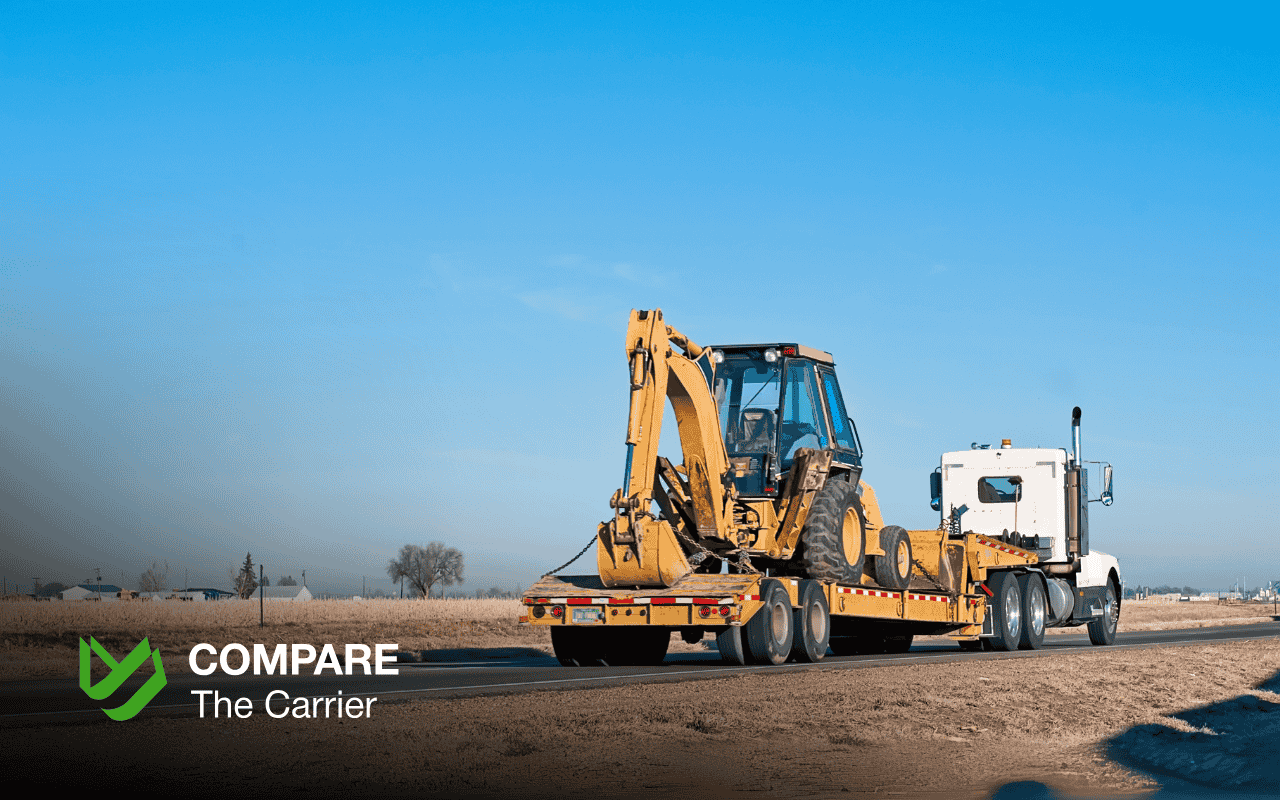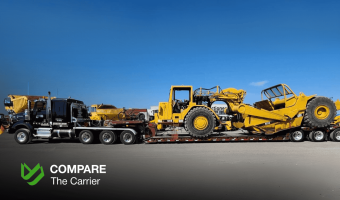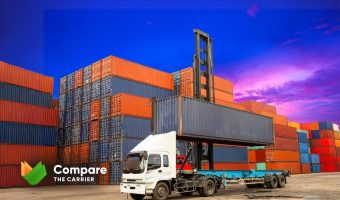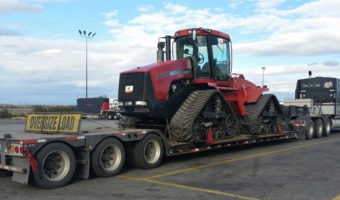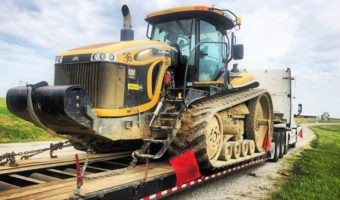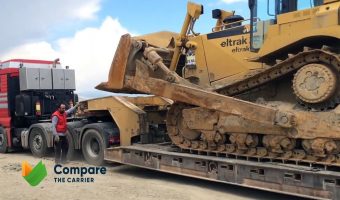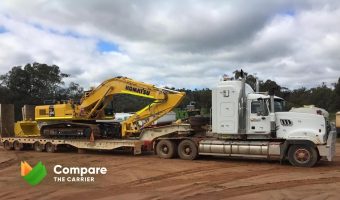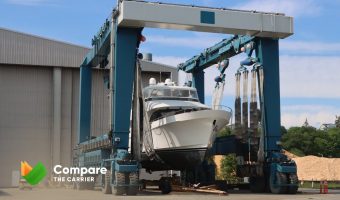Reliable transport partners are essential for industries like construction, agriculture, manufacturing, and energy. And with demand for specialized heavy haulers continuing to rise, choosing a company you can genuinely trust has become even more important.
Recent 2025 FMCSA safety audits and industry reports have uncovered a critical vulnerability in the heavy haul market: nearly 24% of active transport companies now operate with insurance gaps specifically regarding high-value cargo endorsements. As insurance premiums for specialized carriers rose significantly over the past two years, many budget-tier operators scaled back their coverage to ‘standard’ limits, leaving customers exposed to an average of $31,500 in out-of-pocket expenses for uncovered damages. Pair this with the latest Bureau of Labor Statistics (BLS) data which shows the Producer Price Index (PPI) for specialized machinery and heavy equipment has climbed another6.8% year-over-year and the financial math becomes undeniable. In 2026, cutting corners on carrier selection isn’t just a risk; it’s a direct threat to your bottom line, where the ‘cheapest’ quote often precedes the most expensive logistics nightmare.
Finding the best heavy equipment moving company isn’t just about comparing price quotes. It’s about experience, reliability, verified insurance, safety records, and proven handling of oversized and specialized loads.
That’s where Compare The Carrier steps in. Our platform connects you with vetted, licensed, and insured heavy haulers across the U.S., making it easier to choose a mover you can trust. In this guide, we’ll walk you through how to evaluate carriers, what sets elite movers apart, and how to prepare your machinery for a smooth, damage-free transport.
Understanding Heavy Equipment Movers: What You Need to Know
A heavy equipment mover is not just a truck driver. They are precision experts, engineers of logistics, and masters of load distribution. Whether you are moving a 40-ton bulldozer, a robotic manufacturing line, or a fleet of tractors, these professionals ensure your gear arrives intact and legally compliant.
But not all providers operate equally. The barrier to entry in trucking can be low, but the barrier to entry for successful heavy equipment moving is incredibly high. Here is what separates the masters from the amateurs.
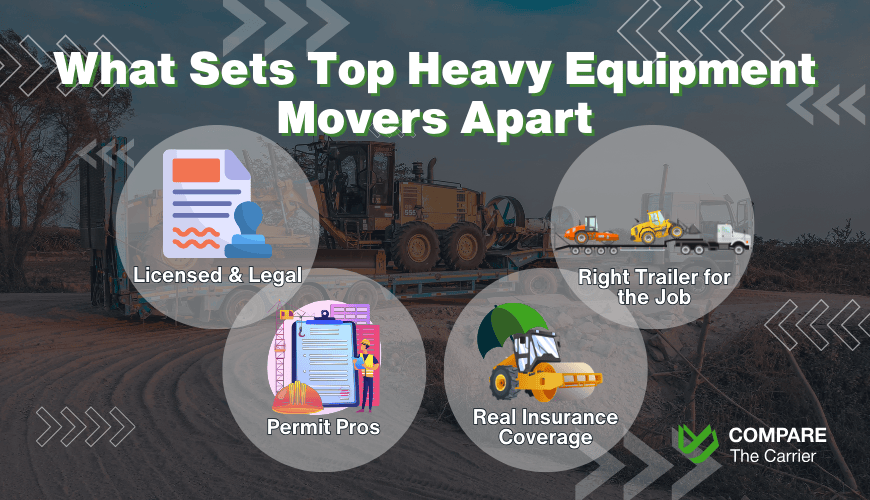
The Nuts and Bolts of Heavy Machinery Transport
Reputable heavy haul transport providers follow a strict process to avoid costly mistakes:
- Licensing & Compliance: Legally, carriers must have active USDOT and FMCSA operating authority. Unlicensed movers risk fines up to $15,000 per violation, which can lead to your equipment being impounded mid-transit. Top construction equipment movers maintain impeccable safety ratings and valid authority that can be verified in real-time.
- Equipment-Specific Trailers: Different machines require different transport solutions. You might need Lowboys for tall bulldozers to clear bridges, RGN (Removable Gooseneck) trailers for driving on towering cranes, or extendable flatbeds for wind turbine blades. Every machine demands specific heavy haul configurations.
- Permit Mastery: Oversized load transportation (generally over 8.5’ wide or 13.5’ tall) requires state-by-state permits. A route from Texas to North Dakota involves navigating multiple jurisdictions, each with different rules. Top movers of heavy equipment handle this paperwork for you, including route planning to avoid low bridges and load optimization to keep costs down.
- Insurance That Actually Covers You: The FMCSA mandates minimum liability coverage, but elite providers offer $2M+ cargo policies for high-value freight. A standard policy might cover a used sedan, but it won’t cover a brand-new combine harvester.
Cutting corners with amateur movers can backfire. For example, a Texas oil rig company recently saved 12% using a cut-rate hauler only to spend $45K repairing a crane damaged by improper RGN trailer loading. Compare The Carrier partners exclusively with companies that move heavy equipment using industry-standard protocols and that have passed our 12-point quality checklist.
This isn’t a DIY job. Partner with pros who speak the language of logistics and liability or risk paying twice.
2026’s Top Heavy Equipment Movers: 20 Industry-Leading Transport Companies
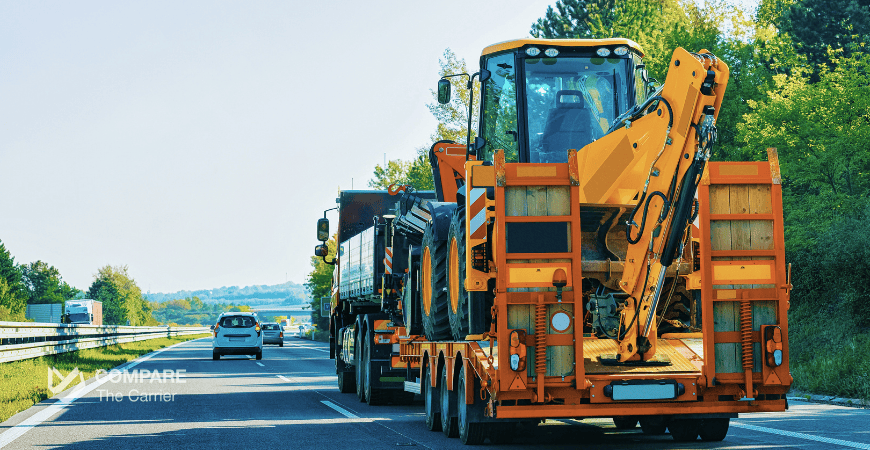
Selecting the right hauler is critical to avoiding delays. To help you navigate this complex landscape, we’ve compiled an updated, expansive list of the top industry players. These aren’t just names drawn from a hat; they are small machinery movers and massive industrial giants that have been vetted for excellence.
These companies have been evaluated based on licensing, insurance coverage, customer reviews, and capabilities in specialized areas like construction, heavy equipment movers, and industrial rigging.
Nationwide Heavy Equipment Movers
Alltracon
- Overview: Dominates the Midwest and Southern U.S. with rapid, turnkey solutions for relocating presses up to 1.5 million pounds. Saves clients 25%+ in downtime through precision rigging and millwright services 1.
- Equipment: Industrial machinery, robotics, conveyor systems.
- Insurance: Full liability coverage; FMCSA-compliant.
- USP : In-house trained riggers and 24/7 project management.
Mammoet USA
- Overview: Global leader in oversized loads, specializing in complex engineering for wind turbines and refinery equipment.
- Equipment: Modular refineries, offshore rigs.
- Insurance: $5M+ cargo policies.
- USP: Hydraulic gantries capable of 900-ton lifts.
Barnhart Crane & Rigging
- Overview: Handles full plant relocations with custom gantry systems and climate-controlled storage.
- Equipment: Power generation units, aerospace machinery.
- Insurance: Comprehensive riggers’ liability.
- USP: ISO-certified safety protocols.
International Van Lines (IVL)
- Overview: Operates in all 50 states and 150+ countries, ideal for machinery needing overseas transport.
- Equipment: Construction cranes, mining drills.
- Insurance: Full-value protection with $2M minimum.
- USP: 48-hour cancellation policy and freight container expertise.
North American Van Lines (NAVL)
- Overview: Offers “guaranteed not-to-exceed” pricing for cross-country moves.
- Equipment: Agricultural combines, CNC machines.
- Insurance: Custom crating for fragile items.
- USP: Satellite tracking for real-time shipment updates.
MoverJet Logistics
- Overview: MoverJet Logistics is a fast-growing transport broker that offers heavy equipment transport services across the continental U.S. Known for their streamlined customer service and fast quoting process, MoverJet connects users with licensed and insured carriers in their network.
- Key Strengths: Competitive pricing through a large carrier database. FMCSA-compliant and fully insured carriers. User-friendly booking and tracking tools. Strong focus on construction and agricultural machinery
- Ideal For: Construction contractors and farm operators looking for fast, flexible transport solutions.
ShipA1 Transport
- Overview: While Ship A1 is well-known for vehicle shipping, it also excels in heavy haul logistics and equipment transport services. The company handles nationwide and international shipments and is praised for its transparency and consistent customer support.
- Key Strengths: Wide service range, including international heavy equipment shipping. Optional door-to-door transport. Custom quotes based on equipment specs. Real-time tracking and responsive agents
- Ideal For: Businesses seeking both domestic and international equipment transport services.
Combined Transport
- Overview: Based in Oregon, Combined Transport has built a strong reputation over the past 30+ years as a leader in oversized load transportation. Their fleet includes stretch trailers, RGNs, and heavy haul trucks designed for extreme dimensions and weights.
- Key Strengths: Deep experience with industrial equipment movers. In-house route planning and load optimization. Advanced logistics capabilities for complex loads. Long-haul expertise for cross-country deliveries
- Ideal For: Companies needing to transport massive machinery with precision and care.
Bennett Family of Companies
- Overview: Bennett is a major name in the heavy lifting companies sector, with a diverse portfolio of transport and logistics services. From industrial rigging services to full-service moves, they handle everything from prep to delivery for machinery of all shapes and sizes.
- Key Strengths: End-to-end project management. Heavy-duty fleet including cranes, lift systems, and multi-axle trailers. Nationwide and international coverage. Experience in high-value, complex projects
- Ideal For: Enterprises needing turnkey solutions, such as robotic manufacturing line relocation or environmental services equipment moves.
Heavy Equipment Transport
- Overview: Heavy Equipment Transport is a dedicated specialist in oversized load transport, offering coast-to-coast and international hauling services. With a proven track record and a reputation for handling the most challenging moves, they’re a go-to for companies transporting complex and high-value equipment.
- Key Strengths: Expertise in construction and agricultural machinery. Customized logistics planning and permit acquisition. Fleet of step decks, flatbeds, lowboys, and RGNs. Real-time dispatch support and tracking.
- Ideal For: Businesses needing custom transportation solutions with a hands-on, full-service approach for heavy haul transport.
Regional Specialists
HeavyHaul Trucking
- Overview: Midwest-focused hauler with a fleet of RGN trailers for low-clearance equipment.
- Equipment: Excavators, forestry equipment.
- Insurance: $1.5M liability coverage.
- USP: Same-day permit procurement.
Able Machinery Movers
- Overview: Texas-based expert in moving million-pound presses and vintage aircraft.
- Equipment: Oil rig components, aerospace tools.
- Insurance: Lloyds of London policies for inland marine risks.
- USP: Combines warehousing and transport under one roof.
Action Heavy Haul LLC
- Overview: East Coast specialist for construction and agricultural machinery.
- Equipment: Skid steers, harvesters.
- Insurance: FMCSA-compliant with $1M minimum.
- USP: Free onsite consultations for oversized loads.
U.S. Machinery Movers
- Overview: Handles “impossible” projects, like elephant relocations and century-old factory moves.
- Equipment: Historical artifacts, nuclear plant components.
- USP: 75+ years of niche rigging experience.
Keen Transport
- Overview: Pacific Northwest leader using AI-powered route optimization.
- Equipment: Solar farm panels, turbine blades.
- USP: Carbon-neutral shipping options.
Budget-Friendly Option
ATS Specialized, Inc.
- Overview: Affordable end-to-end logistics, including rigging and installation.
- Equipment: Packaging lines, HVAC systems.
- Insurance: Released Value Protection (RVP) included.
- USP: 15% discounts for repeat clients.
U-Pack
- Overview: Container service charging only for space used—ideal for small businesses.
- Equipment: Tractors, compactors.
- USP: 600–5,100 for 1,000-mile moves.
Moving APT
- Overview: Broker connecting clients to 2,500+ vetted regional carriers.
- Equipment: Farm machinery, printing presses.
- USP: Price-matching guarantee and 20% off promo codes.
Heritage Industrial Services
- Overview: Low-cost maintenance and transport for poultry and food processing plants.
- Equipment: Conveyor belts, industrial mixers.
- USP: Free equipment inspections pre-move.
JK Moving Services
- Overview: Mid-Atlantic’s top choice for white-glove handling of fragile machinery.
- Equipment: Lab equipment, antique presses.
- USP: AI-powered claims processing for faster reimbursements.
Why Compare The Carrier Simplifies Your Search
Instead of vetting 15+ companies individually, Compare The Carrier streamlines the process:
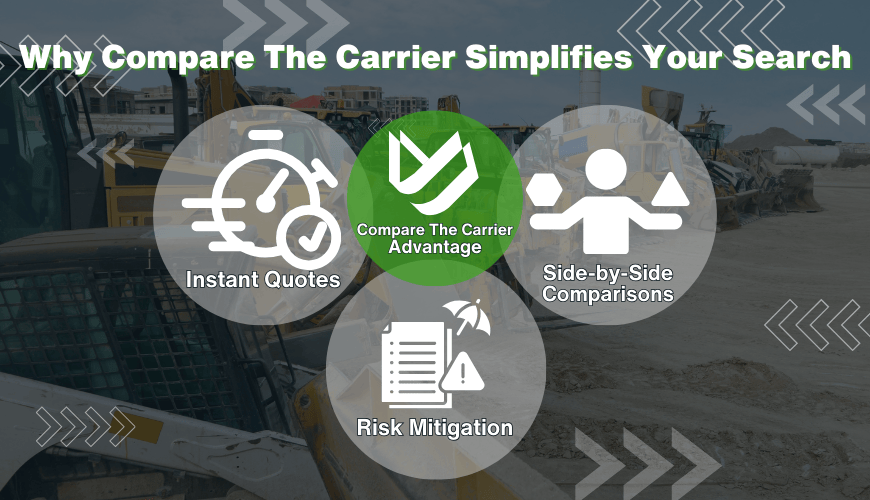
- Instant Quotes: Input your equipment specs and receive tailored bids within hours.
- Side-by-Side Comparisons: Filter by insurance, permits, or delivery timelines.
- Risk Mitigation: All listed carriers are FMCSA-licensed and BBB-accredited.
For example, a recent user saved $12,000 on a 2,000-mile crane relocation by comparing quotes from 8 providers—all within 20 minutes.
What Top Heavy Equipment Transport Companies Won’t Tell You
Getting quotes is just the first step. Even reputable heavy machinery moving firms might not share crucial details that impact your timeline and cost. Here is the insider knowledge you need to look for:
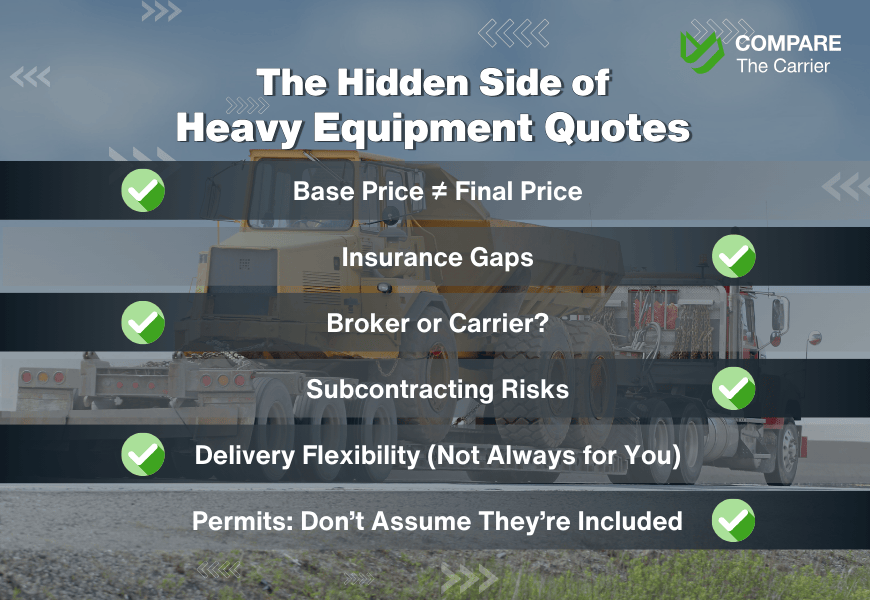
- The Quote Isn’t Always Final: Base rates can look great until “accessorial fees” surface. Did you know you can be charged for “driver detention” if your site isn’t ready to load immediately? Or fees for special permits for oversized load transportation across states? Escort vehicles (pilot cars) and fuel surcharges are other common additions. Always ask for a detailed fee breakdown from any machinery transport provider.
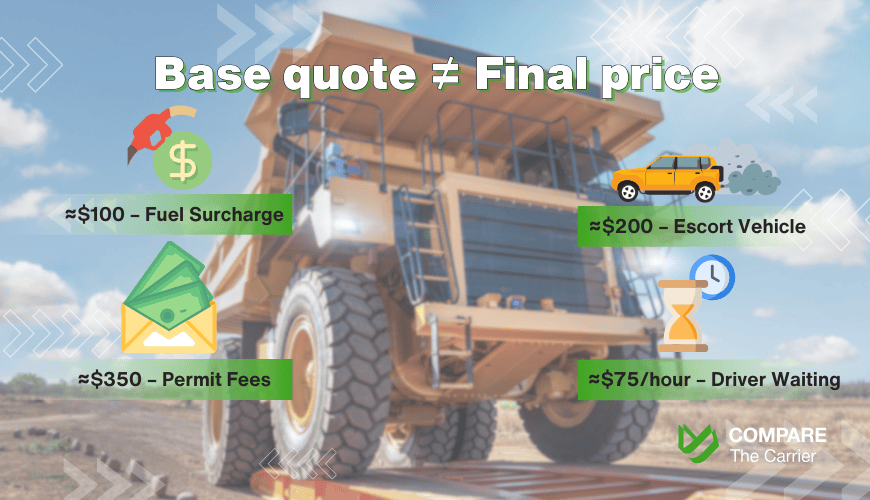
2. “Insured” Doesn’t Mean “Fully Covered”: Standard cargo insurance from heavy moving companies often includes limits and exclusions. Does the policy cover “replacement cost” or just “depreciated value”? High deductibles or uncovered damage types (like cosmetic scratches or electronic calibration issues) are common. Always verify the exact insurance coverage, especially if you require heavy equipment moving service for high-tech robotics.
3. Broker or Carrier? Some providers are brokers who connect you with carriers. Direct industrial relocation services (asset-based carriers) own their fleet. Brokers offer a wider network, but carriers offer direct control. Knowing who is actually moving your load is vital for accountability.
4. Flexible Delivery Windows: Unless you pay a premium for guaranteed dates, expect flexible delivery ranges. Factors like weather, construction, or permit delays impact heavy machinery moving services. A reputable company will be honest about these potential delays.
5. Who Handles Permits? Every oversized or overweight equipment shipment involves permit requirements. Some carriers manage them; others expect you to. Ensure your contract states who obtains the permits. This is vital for equipment relocation compliance.
6. Who Handles Permits? Get It in Writing: Every oversized or overweight equipment shipment involves permit requirements. Some carriers manage them—others don’t. For farm equipment shipping, rural route permits can be especially tricky. Ensure your contract states who obtains the permits, who pays, and who’s liable if there’s an issue. Read more in Navigating rural routes during farm equipment transport.
Staying aware of these hidden factors empowers smarter decisions and helps you avoid unexpected setbacks. Platforms likeCompare The Carrier pre-vet all listed heavy equipment movers, verifying their insurance, licenses, and compliance with FMCSA standards. They also simplify side-by-side quote comparison, so you can spot red flags before you commit
Preparing Your Heavy Machinery for Transport
Proper preparation is essential for ensuring your valuable heavy machinery arrives safely and avoids unexpected delays or costs. Taking these steps protects your equipment and helps your chosen machinery moving services provider do their job efficiently:
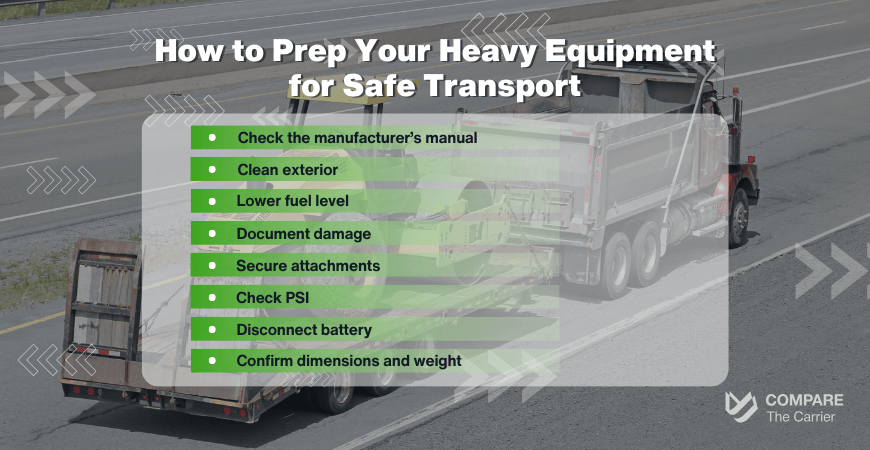
- Consult the Manufacturer’s Manual: Always start here. Your equipment’s manual provides specific instructions for transport, including exact tie-down points and component securing procedures. Following the manual is the first step in successful heavy machinery moving company collaboration.
- Clean Your Equipment: Thoroughly wash the exterior, including tracks, wheels, and the undercarriage. A clean machine allows for an accurate pre-shipment inspection. Furthermore, it helps comply with regulations regarding soil or contaminant movement, which is critical for agricultural gear.
- Perform a Detailed Inspection: Before the heavy moving company arrives, conduct a walk-around inspection. Document any existing damage dents, scratches, cracks, or leaks with high-resolution photos and videos. Share this inspection with the heavy machinery transport companies to avoid disputes later.
- Check and Secure Fluids: Reduce fuel levels to less than a quarter tank unless instructed otherwise to save weight and reduce fire risk. Tighten fluid caps (fuel, hydraulic, coolant). Depending on your carrier and state regulations, some fluids may need to be drained entirely.
- Secure Loose Parts and Attachments: Remove or firmly secure any detachable items that could shift during transit tools, buckets, counterweights, and cab contents. Retract booms, blades, or extensions. This is especially important for the best moving companies for heavy equipment to ensure the load stays balanced.
- Disconnect Batteries (If Required): Disconnect Batteries (If Required): Ask your heavy equipment mover whether battery disconnection is needed. Some haulers require cables to be secured away from terminals to prevent accidental startup or electrical shorts during the vibrations of transit.
- Check Tires and Tracks: Ensure tires are inflated to the proper PSI. For tracked machines, inspect for excessive wear or damage that may worsen during loading. Proper readiness avoids surprises during pickup, especially for heavy equipment moving projects involving long hauls.
- Confirm Dimensions and Weight: Double-check the accurate operational weight and dimensions (length, width, height) of your machinery in its transport configuration. Providing precise details to your construction equipment movers is critical for selecting the right trailer and obtaining necessary permits.The choice between FTL and LTL might also influence trailer needs, depending on your shipment size.
Visual Guide for Preparation:
For a practical walkthrough, especially for Caterpillar equipment, check out this helpful video:
Master Guide: Prepare Your Caterpillar Heavy Equipment for Shipping in 6 Easy Steps!
Communicating clearly with your selected heavy equipment transport company throughout this preparation process is key. They can provide specific guidance based on their equipment and the route. Proper preparation minimizes risks and ensures a smoother move for everyone involved.
Conclusion: Secure Your Move with Confidence
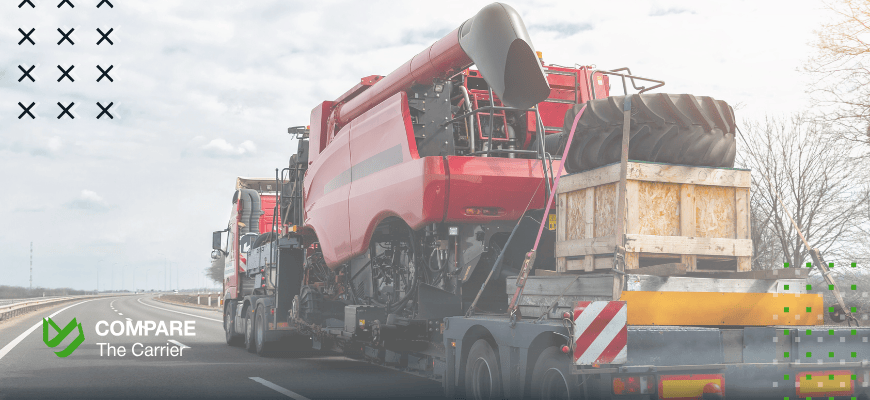
Choosing the right heavy equipment mover is more than just logistics; it’s a critical decision that impacts ySelecting the right heavy hauler isn’t just another step in your project it’s a decision that can influence your timeline, budget, and the overall safety of your equipment. From evaluating carriers to understanding true costs and preparing your machinery, there’s a lot to consider, and it pays to be thorough.
That’s where Compare The Carrier makes things easier. Instead of spending hours researching and guessing, you get direct access to a trusted network of licensed, insured, and thoroughly vetted heavy equipment movers. Whether you need nationwide coverage, a regional specialist, or a more budget-friendly option, you can compare real choices and secure competitive rates without the stress.
With our platform, you’re not navigating this alone you’re backed by a curated network of reliable haulers who meet your project’s needs from start to finish.
Why It Works:
- Real-time comparisons on pricing, timelines, and carrier capabilities.
- Full transparency on licensing, insurance, and verified reviews.
- One simple quote request multiple bids from trusted pros.
- Support for moving large equipment, farm equipment shipping, heavy haul logistics, industrial rigging services, and custom transportation solutions.
Save time. Avoid hidden costs. Get peace of mind.
Don’t leave your equipment’s future to chance. Visit CompareTheCarrier.com to request your free quotes today and move forward with confidence.
FAQ
What specific insurance details should I verify with potential heavy equipment movers?
Check their cargo insurance limit to make sure it fully covers your equipment. Ask about the deductible, what’s excluded, and request a Certificate of Insurance. Reliable carriers will provide this without hesitation.
How far in advance should I book machinery moving services?
Booking 1–2 weeks ahead is usually enough. For oversized or specialized loads, or during busy seasons, try to book 3–4 weeks in advance to secure the right carrier at a good rate.
What’s the difference between flatbed, step-deck, and RGN trailers?
A flatbed is the standard option. A step-deck sits lower, allowing for taller equipment. An RGN has a removable front so equipment can be driven directly onto the trailer. Your carrier will recommend the best option based on your equipment.
Can heavy equipment movers handle international shipping?
Yes, some companies do. International moves involve customs, different regulations, and often multiple transport methods, so make sure the provider has real experience handling overseas equipment shipments.
What happens if my equipment is damaged during transport by a heavy hauler?
If damage occurs, take photos or videos right away and note it on the delivery receipt. Then contact the heavy hauler and their insurance provider to start a claim. Your pre-transport inspection report will help speed up the process.
Do I need to be present for the pickup and delivery of my heavy equipment?
Yes. You or an authorized representative should be there to verify the equipment’s condition, oversee loading and unloading, and sign the Bill of Lading correctly. This is standard for all professional heavy haulers.
How does Compare The Carrier verify the heavy equipment transport companies on its platform?
Compare The Carrier verifies that listed industrial moving company partners have active operating authority (e.g., DOT/MC numbers), meet required insurance levels (often checking via FMCSA records), and maintain satisfactory safety and business ratings (like BBB where applicable), providing users with a network of more reliable carriers.
Are permits always required for heavy machinery transport?
Not always, but frequently. Permits are typically needed if the heavy machinery movers load exceeds standard legal dimensions (width, height, length) or weight limits for the specific roads and states it will travel through. Experienced carriers will determine the necessary permits, but you should confirm this is included in their service and quote.
What are common risks associated with choosing cheap or budget heavy equipment movers?
While saving money is tempting, ultra-low quotes from some budget machinery moving providers can hide risks like inadequate insurance coverage (leaving you liable for damage), unreliable scheduling, poorly maintained transport equipment, inexperienced operators, unexpected fees added later, or even operating without proper authority. Vetting carriers properly, often simplified through platforms like Compare The Carrier, helps mitigate these risks regarding heavy equipment movers.
